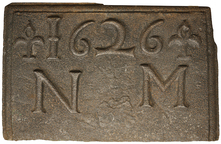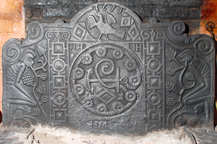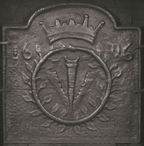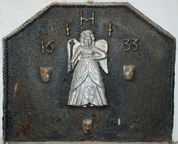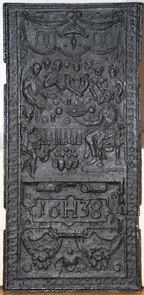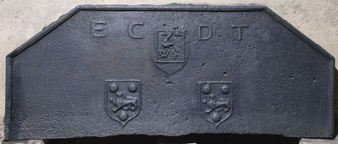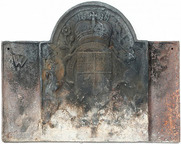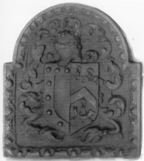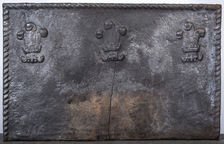-
1107
Description: Rectangular shape; ovolo edging (top and sides); top centre, date between two fleurs-de-lys; below, initials spaced apart.
Notes: A small fireback, probably for an upstairs fireplace. Formerly at Cothay Manor, Wellington, Somerset. Auction: Duke's, Dorchester, 7 Sep 2018 lot 585 (£360).
Inscription: 1626 / N M
- Decoration tags:
- rectangular (shape)
- ovolo (edging)
- individual letters
- individual numbers
- heraldic
- text
Manufactured: in 1626 in England.
Current location: in private hands, Wigmore, Herefordshire, England.
- Attached to series:
- Miscellaneous stamp firebacks
-
1064
Description: A rectangular field with a central circle containing a fouled anchor, the rope gathered in eleven loops around it; in the top spandrels the initials HH, on the left, and IH, on the right; below the circle, the initials IM inset in a square; on each side, a strapwork Ionic pilaster formed of alternate hollow squares, with a pyramidal infill in low relief, and hollow circles; outside each pilaster, a crouching stylised humanoid figure, facing inwards, disgorging a fructed vine; above the figures two opposed volutes, forming part of the edging; above the central field, a semi-circular compartment containing a bird, its wings inverted, and three hollow diamond shapes irregularly arranged; the date above the bird; protruding from the edging above each pilaster is a small, inward-facing scroll. Three vertical plank lines can be discerned, one in front of the right-hand figure, one through the I of the initials IH, and one to the right of the second H of the initials HH. The whole design is in low relief.
Notes: This is a reworking of a design seen on a fireback of 1608 (no. 585) though intentionally stylised. The decorative elements have yet to be fully interpreted; on the 1608 version the figures are fauns, the vines disgorged from their mouths being related to the 'green man' tradition associated with woodland spirits and symbolising resurrection, the latter echoed by the bird which, on the earlier version is a phoenix. However, in the form in which they appear on both firebacks they may be purely decorative devices. By contrast, the cabled anchor is the badge of the Lord High Admiral but in 1633 the office was vacant. The initials IM indicate that this is an early work by a prolific fireback pattern-maker more usually associated with the eastern Weald.
Inscription: 1633 / HH IH / IM
- Decoration tags:
- rectangular with round arch (shape)
- fillet (edging)
- whole carved pattern
- planklines
- pictorial
- mythological
- text
- animals
- humans
- plants
- objects
Manufactured: in 1633 in the Weald area of England.
Current location: Pound Farm, Common Road, Dunsfold, Surrey, England.
Citation: Wall, J. R. S., 20 May 1965, 'Wealden Fireback' [letter], Country Life, p. 1208.
- Attached to series:
- IM series
- Brede group
-
58
Description: Arched rectangular shape; cavetto edging; a pheon (a downward-pointing arrow head barbed on the inner edge), the badge of the Sidneys, within a wreath, an earl’s coronet above; the date on either side of the coronet.
Notes: The badge is of the Sidneys, Earls of Leicester. The date is most likely to be 1626 as the Earldom was not conferred upon Robert Sidney until 1618 and he died in 1626. A recast plate.
Inscription: 16 [?]26
Arms: Badge of Sidney family, Earls of Leicester
- Decoration tags:
- rectangular with round arch (shape)
- astragal (edging)
- whole carved pattern
- individual numbers
- heraldic
- text
Manufactured: in the early- to mid-17th century possibly at Robertsbridge Furnace, Salehurst in the Weald area of England.
Current location: Florence Court, Enniskillen, Fermanagh, Northern Ireland.
Museum number: 630836 (part of the National Trust museum group)
- Attached to series:
- Earl of Leicester series
- Personal firebacks
-
293
Description: Canted rectangle; inset twisted rope edging (top and sides); stamp formed of a statuette of an standing angel with left hand at the waist, and holding a sceptre in the right hand; date split either side of angel; initials in triad above angel; small face stamp repeated three times, one each side of angel, and one below.
Notes: The identity of those to whom the initials refer is not known; the use of the angel statuette is a rare inclusion of a religious motif on an English fireback. A variant of this fireback is at the Lygon Arms Hotel, Broadway, Worcestershire (no. 1027).
Inscription: IHI [triad] / 16 33
- Decoration tags:
- rectangular with canted top corners (shape)
- rope (edging)
- carved stamps
- individual letters
- individual numbers
- text
- humans
Manufactured: in 1633 in the Forest of Dean area of England.
Current location: Flaxley Abbey, Flaxley, Gloucestershire, England.
Citation: Bick, D. E. [incorrectly printed as Bick, R.], Sept 1985, 'Firebacks', Period Homes, pp. 21-4.
- Attached to series:
- Figurine firebacks
- Angel series
-
565
Description: Rectangular; flanged edging; small guilloche pattern down each side and along the bottom; upper panel, pictorial scene of the Marriage at Cana; lower panel, inscription panel within a strapwork cartouche with flowers below.
Notes: An end stove plate with a popular scene from the New Testament - John 2.
Copies of this fireback are known.
Inscription: 16 H 38
- Decoration tags:
- rectangular (shape)
- flanged (edging)
- whole carved pattern
- pictorial
- biblical
- text
- humans
Manufactured: in 1638 possibly in the Siegerland area of Germany.
Current location: Folkestone Library and Heritage Centre, Grace Street, Folkestone, Kent, England.
(part of the Folkestone Library and Heritage Centre museum group)
- Attached to series:
- Stoveplates
- Marriage at Cana stoveplates
-
68
Description: Canted rectangle; ovolo edging (top and sides); symmetrically arranged, initials separated by overpressed, fillet edged stamp bearing letters WF surmounted by a bent arm holding a battleaxe issuing from a chapeau; beneath are two shields bearing the arms of Fowle.
Notes: The shield and crest stamps relate to William Fowle (1568-1634) and are those used on iron grave slabs in Wadhurst and Frant churches and in Maidstone museum, as well as on other firebacks. The initials have not been identified. The fireback was formerly in Riverhall, Wadhurst, built by William Fowle. Another casting with the same set of initials, but in a slightly different arrangement, has been noted (no. 1077), and Christy (1908 p.386) reported on another with slots for two firedogs.
Inscription: EC DT / WF
Arms: William Fowle, of Frant and Wadhurst
- Decoration tags:
- rectangular with canted top corners (shape)
- astragal (edging)
- carved stamps
- individual letters
- heraldic
- armorial
- text
Manufactured: in the early- to mid-17th century probably at Riverhall Furnace, Wadhurst in the Weald area of England.
Current location: in private hands, Frant, East Sussex, England.
- Attached to series:
- Fowle series
-
900
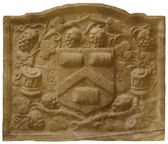 ? x ? mm
? x ? mmDescription: Low stepped-arched rectangular shape; ovolo-moulded edging; central shield backed by a cartouche, surrounded by grape bunches, vines and leaves.
Notes: Arms of the Worshipful Company of Vintners - sable, a chevron between three tuns argent - were granted in 1442. From a photograph in the J. Starkie Gardner Collection, Victoria & Albert Museum, Archive of Art and Design (AAD/2014/8).
Arms: Worshipful Company of Vintners
- Decoration tags:
- rectangular with round arch (shape)
- ovolo (edging)
- whole carved pattern
- armorial
- plants
- objects
Manufactured: in the early- to mid-17th century in England.
Current location: not known.
- Attached to series:
- Livery company firebacks
-
1281
Description: Composite; arched rectangular shaped, armorial fireback, cavetto edging, with Stuart Royal arms, garter, supporters, crown and motto, and 1639 date above crown; this overlies a rectangular plate with fillet edging; top centre in the space each side of the central shield, an initial letter - W to left, C to right.
Notes: One of several variants using a fireback with the English Stuart royal arms, the date probably altered according to when it was cast. The original date of the fireback was probably 1619. Garth's Auctioneers, Columbus, OH, 3 Jan 2015, lot 2347 ($300).
Inscription: 1639 / W C
Arms: English Stuart royal
- Decoration tags:
- rectangular with round arch (shape)
- fillet (edging)
- carved stamps
- whole carved pattern
- composite
- extension panels
- heraldic
- armorial
- royal
- text
Manufactured: in 1639 possibly in the Forest of Dean area of England.
Current location: not known.
-
898
Description: Arched rectangular; ovolo-moulded egg and dart edging; shield surmounted by helm and indistinct crest, with elaborate mantling.
Notes: Blazon (bordure bezanty impaling a chevron between three bugle horns) is unidentified. The date of c.1730 suggested by Gentle and Feild is unlikely to be correct.
Arms: Not known
- Decoration tags:
- rectangular with round arch (shape)
- ovolo, egg and dart (edging)
- whole carved pattern
- armorial
Manufactured: in the early- to mid-17th century in England.
Current location: not known.
- Attached to series:
- Personal armorial firebacks
-
1019
Description: Rectangular; twisted rope edging; top centre and corners, stamp formed of three ostrich feathers within a coronet, repeated three times.
Notes: The ostrich feathers are the badge of the Prince of Wales; a recast plate. Gildings Auctioneers, Market Harborough, 19 Apr 2016 lot 529.
- Decoration tags:
- rectangular (shape)
- rope (edging)
- carved stamps
- heraldic
- royal
- objects
Manufactured: in the early- to mid-17th century in England.
Current location: not known.
- Attached to series:
- Prince of Wales' feathers series
- Prince of Wales firebacks
